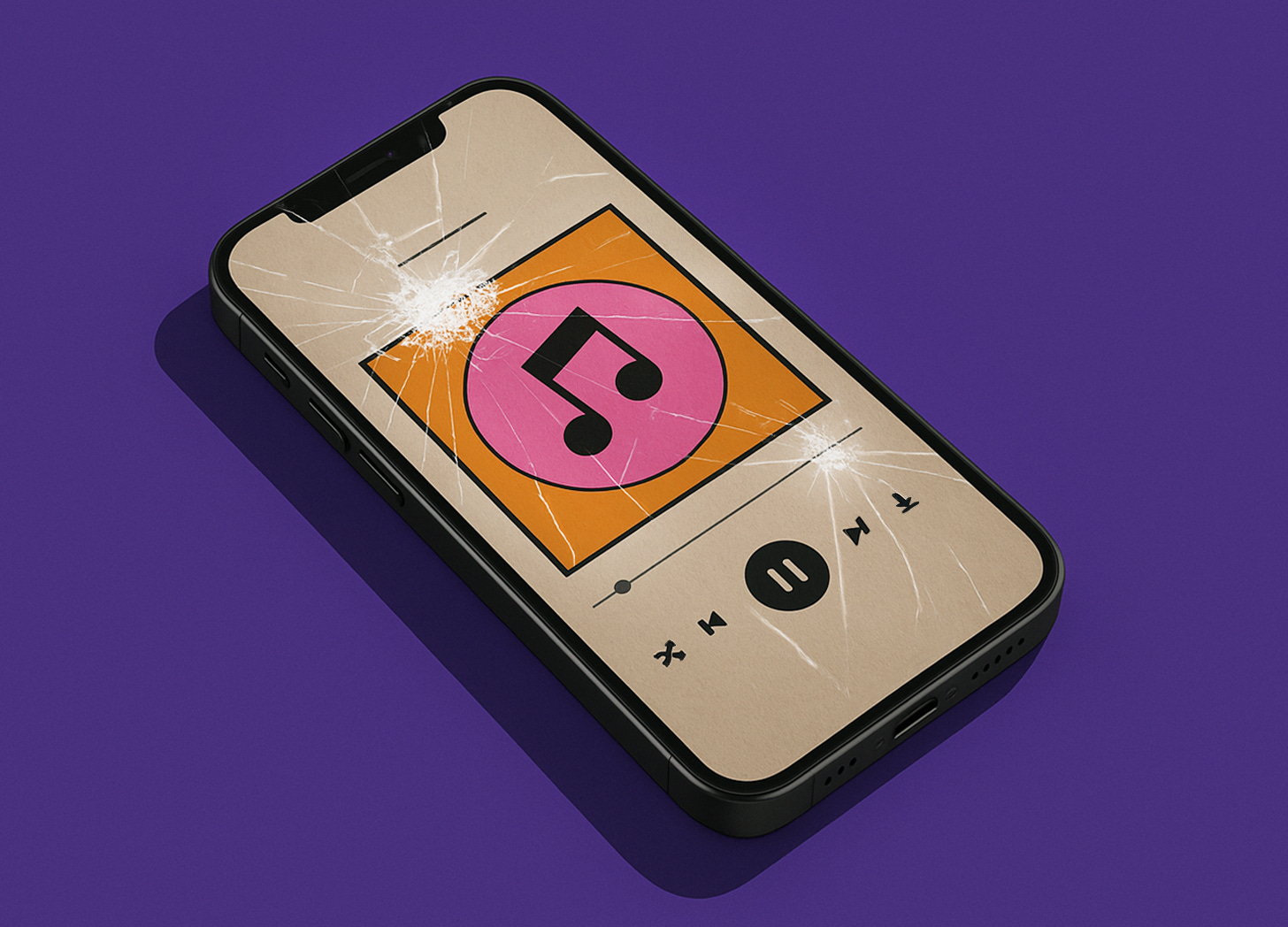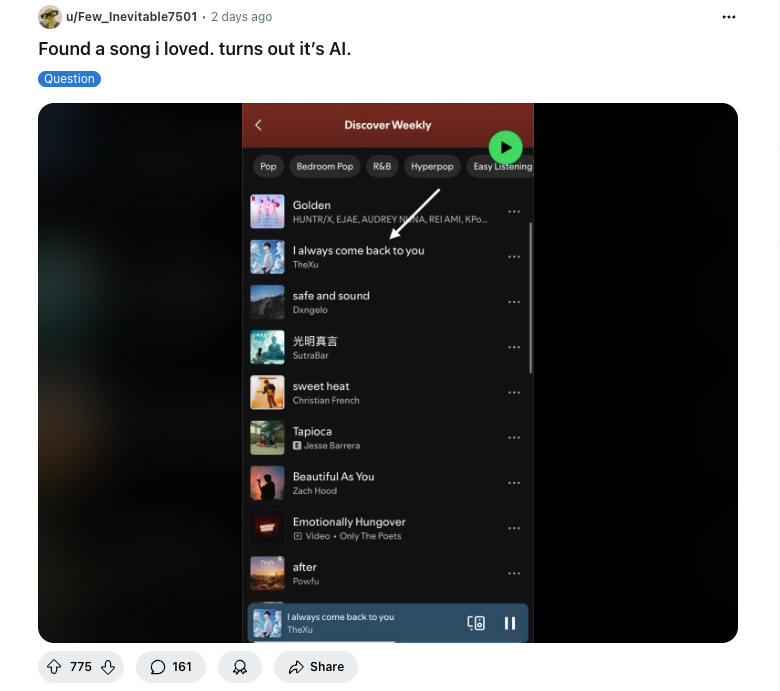AI Music Is Going Viral, But It’s Not What Fans Want.
Streaming is cracking. AI slop is flooding the feed. Artists are getting squeezed. But fans don't want more music—they want music that matters.

At the turn of the music streaming era, I said the quiet part out loud:
The people who grew up downloading music for free weren’t going to start paying to own it. But maybe they would pay for access.
And they did. Renting access to music became the norm.
As a fan, I asked for convenience—and I got it.
The experience of instantly listening to whatever you want, whenever you want and seamlessly sharing music globally is incredible.
But it came at a cost.
Today, I feel the tension building again. The seams of the streaming ecosystem are splitting, and we’re on the brink of another major shift in how we listen to and connect with music.
Streaming is cracking.
Streaming squeezed passionate music fans, mass music listeners, superstars and working musicians into a one-size-fits all model.
Now, it’s breaking down:
As more music than ever floods streaming services and revenue growth slows, it’s a race to the bottom.
Artists are now competing with AI-generated songs and fake artists for a slice of the same pie, getting squeezed for shrinking returns as the value of each stream keeps decreasing.
The broader music ecosystem is also in trouble: Music has become infinite but forgettable, discovery is a lottery, touring is unsustainable, fan relationships are mediated by opaque algorithms—and there is no safety net.
And for passionate music fans, the cracks are starting to show. Streaming music feels repetitive and bloated. A flattened grid, devoid of magic and context.
AI slop is here.
AI-generated songs already have millions of streams and are being recommended in algorithmic playlists:
The Velvet Sundown, an AI-generated “rock” band, has over 600,000 monthly listeners on Spotify and is on all other major streaming platforms.
A “soul” song without a soul, made with Suno, “A Million Colors,” is the first known AI song to chart on TikTok, with over 1 million Spotify streams.
Aventhis, a “dark country project” is “harnessing the creative power of AI” according to it’s Spotify bio, has over 1 million monthly listeners.

The Amazon Basics of music
The truth is AI-generated music will be good enough for a lot of listeners.
And corporations are incentivized to promote it. Infinite content at zero marginal cost? A business dream.
We’ve already seen this play out with “fake artists,” also known as perfect fit content, tracks commissioned at cheaper rates for playlists and listed under pseudonyms, covered extensively in Liz Pelly’s Mood Machine.
Meanwhile, all three major labels are simultaneously suing and negotiating licenses with the generative AI music startups, Suno and Udio.
It’s a moment that feels familiar to the late 90's when CD growth was slowing, prices were shooting up and consumer’s were fed up…Then Napster came.
But Napster solved fan problems: free access, no gatekeepers, only the songs you wanted.
AI music solves corporate problems: It's cheaper. Doesn't get sick or old or pregnant. Can’t complain about pesky royalties. Or have opinions about the world.
Why not substitute art by humans with an imitation at a lower cost? If people like it and the result is all the same, who cares?
But AI is not just riffing off of culture, it’s parasitically built on top of it. Without consent or compensation.
AI-generated music will be good enough for background listeners, but for the people who care about the experience of fandom, the “Amazon Basics” of music isn’t satisfying.
Music that matters
Streaming may be a background activity, but being a music fan is a lean forward one—it can define your whole life.
I don’t buy the idea that people simply care less about music today.
If you think I’m wrong, look closer: music culture is happening everywhere, but it’s fragmented across Reddit threads, DIY shows, fan remixes and mashups, independent record stores, Discord channels, group chats, independent radio stations, live streamed music reviews and Substacks of niche playlists.
Fans spend hundreds on live shows, vinyl or merch for all sorts of non-obvious reasons: to signal identity, taste and support.
Vinyl sales have risen for 18 years straight. Half of purchasers don’t even own a turntable.
Independent artists now account for half of all streams. Even pop has gotten weirder and more niche-ified.
Fans are spending $300+ just to see their favorite artists perform live (and sometimes going into debt to do so). Ticketing companies are raking in the profits, but what fans are really paying for is access to the artist’s world, experiences, and story.
Anecdotally, I routinely walk past a Polish community center turned 1,000 capacity music venue in my neighborhood and see a line of young people camped out all day to get a good floor spot to see artists I have never heard of before.
My old college radio station has doubled in size in the last decade.
But the young, passionate music fans I follow and speak to today are feeling uneasy about the future of music. They use streaming services reluctantly but supplement with vinyl collections, or are ditching streaming altogether.
These aren’t just scattered behaviors, they’re signals of latent demand.
We don’t need more music, we need music we care about.
Music is no longer scarce. But meaning, storytelling and world-building are.
Music that matters and AI aren’t necessarily at odds.
In the right hands, AI can enable new, immersive and interactive creative experiences—without shaking down artists and stripping songs for parts.
But the systems in place today incentivize flooding platforms with slop, optimizing for scale over depth, and cutting artists out of the loop.
Music lovers don’t need AI stock music.
We need new experiences that work with artists and for fans.
Building a new home for music culture
The next great platform for music won’t be a streaming service. It will be a home for music culture.
The rise of AI generated music will spark a counterculture renaissance.
Built by and for music lovers. Where artists, curators and the most passionate music fans build worlds, share their taste, trade musical lore and create culture together.
A sustainable, profitable business that puts money in the pockets of artists and tastemakers.
That succeeds with its users, not at their expense.
Because the future of music belongs to artists and fans. Not AI. Not billionaire oligarchs.
Technology changes the tools. Artists and fans change the culture. Together, they reshape music.
We are on the edge of a format shift again. Join me here as we imagine and create what comes next.






100%
AI removes the most annoying part of music for business people — the musicians.
One way I am adapting my music to the ecosystem is abandoning the slick studio polish sound of modern recordings, and instead letting the output be raw and choppy. Letting the flaws shine through. The flaws are more interesting and also harder for the AI to replicate.
This article nails it — the flood of AI-generated music may fill the streams, but it often lacks the heartbeat that connects artists and fans.
As someone who uses AI tools in the studio but starts every song from my own samples and real human voices, I see clearly that technology is just a tool, not the soul.
The challenge is not creating more music — it’s creating music that matters. Music that carries stories, scars, sweat, and spirit.
Fans don’t just want sound; they want connection, meaning, and a glimpse into the artist’s world. That’s why live shows, vinyl, and grassroots scenes are thriving despite the digital noise.
The future of music lies in artists and fans reclaiming culture together — where AI can empower, not replace.
Respect to all pushing for depth in an age of endless streams.
— Fotios Mytikas Producer & Creator of A.I Artist "Roselune Everly"